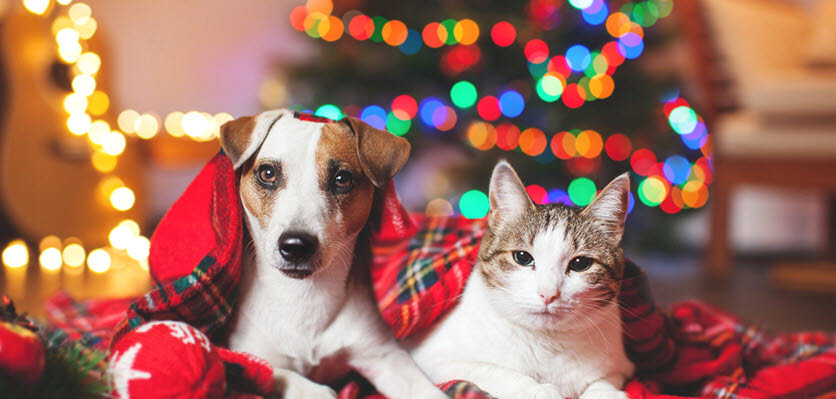
With the end of the year rapidly approaching, it heralds a period of long, warm days with family, festivities and Christmas traditions. We love to involve our pets in holiday traditions, but the festive season presents many potential hazards for pets. Read our top tips for keeping your pet safe this Christmas so you can relax and enjoy the holidays with the whole family.
Pet costumes
Dressing your pet as Santa or an elf can present great photo opportunities. However, many pets don’t enjoy wearing costumes, especially cats. Keep an eye on your pet’s behaviour before and after wearing a costume, to pick up any subtle cues of fear or distress. If your pet is showing any sign of discomfort wearing the costume, take it off and give the dress-ups a miss. Don’t ever leave a pet wearing a costume unsupervised, and if it’s a hot day, reconsider using one at all, as pets can quickly become hot and overheat.
Tinsel and decorations
Whether the decorations on your tree and around your home are store-bought or handmade, they can present a hazard to curious pets. Unfortunately, many veterinarians see pets over the festive season after having eaten tinsel or other Christmas decorations. Birds, puppies and kittens are at highest risk as they are very curious, so always have decorations out of reach of pets. If you think your pet might have eaten a decoration, contact your veterinarian immediately.
Stocking stuffers
Many of us give gifts to our pets over the festive season, with some pets even getting their own stockings! If you are planning on giving your pet a present this Christmas, double check the toy or treat will be safe. Treats should be produced to the Australian Standard for the Manufacturing and Marketing of Pet Food (AS 5812 - 2017). Toys should only be given under supervision, to ensure they don’t present a choking risk if destroyed.
Leftover food
Christmas lunch and dinner often involve copious amounts of food, resulting in the almost inevitable Christmas leftovers. While it can be tempting to give these leftovers to our pets, it’s best to steer clear, as many leftovers such as fatty meats like ham, fruit like raisins and grapes, or vegetables like garlic or onion can present a serious risk.
Keep cool
In many areas of the country, Christmas is one of the hottest times of the year. Ensure your pet stays cool by ensuring they have access to plenty of cool, fresh water, shade and good ventilation at all times. If you think your pet might be suffering from heat stroke, cool them down with wet sponging and call your veterinarian immediately.
Update microchip details
If travelling with your pet this festive season, ensure they are microchipped and the details on the microchip are up-to-date. If you have changed phone number or address recently, update them on your pet's microchip before travelling to allow you to be contacted in case your pet goes missing.
Dealing with fireworks
Fireworks increase in frequency during the Christmas break, and for many pets, this is a scary prospect. Keep your pet calm during fireworks by bringing them into the home, providing a quiet, safe place for them to escape to and by having the TV or music on in the background.
Keep chocolate out of reach
Although dogs love the smell and taste of chocolate, even small amounts can prove deadly. Chocolate contains chemicals which are toxic to dogs, so take steps to move chocolate out of their reach and ensure everyone in the family knows not to leave chocolate out. If you suspect your dog has eaten chocolate, call your vet immediately.
Toppling trees
Many cats will see a Christmas tree as a challenge. Ensure the base of your tree is secure, to prevent it toppling if your cat decides to rise to the challenge.
If you’re worried about your pet during the festive season, whether it’s due to Christmas related activities or not, don’t delay in seeking treatment. Contact your veterinarian, or an emergency veterinarian, for advice and assistance.
